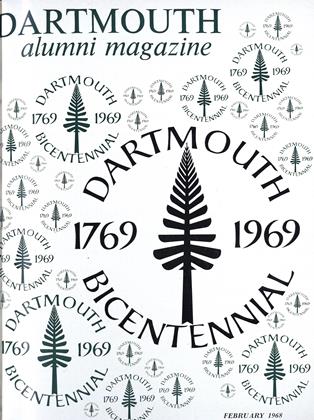The Dartmouth Experimental College began its fourth term and second year last month with over 750 registrants and what its organizers term a "very gratifying response" from students, faculty, and community.
"New, flexible, and daring" are words used in the DEC's catalogue to describe the increased number of 25 courses offered this winter term. Emphasis is being placed on human values in a world of advancing science, with five seminars addressed to that contemporary problem. At the end of the term, the Experimental College plans to bring participants from all five seminars together for discussions.
Other courses range from film production and film criticism to investigations of the United Nations and higher education. An innovation even for the DEC is the "Group Dynamics Workshop" coordinated by Chaplain Paul Rahmeier, adviser to the Dartmouth Christian Union. Trained personnel will conduct the sessions where groups of ten people meet intensively for approximately 15 hours in a single weekend. It aims at insight into emotional and intellectual factors in group interactions.
Carl Oglesby, the College's first Tucker Resident Fellow and past president of Students for a Democratic Society, will conduct "Containment, Change, and the New Left," an investigation of that movement in both the United States and the Soviet Union.
"Japanese Language and Literature" continues from the fall term and gives a beginning section for newcomers. Music is represented by courses in "The Art of the String Quartet," "The Blues Guitar," and "Absolutely Bob Dylan."
The DEC, initiated and propelled by the students themselves, has compiled a highly imaginative program, bound to lead to increasing success of the two- year-old "experiment."
Computer Milestone
On the afternoon of January 18 the Dartmouth Computation Center made electronic history when more than 100 persons used the same computer at the same time. The peak load was 113 and nearly every request got a response within ten seconds.
Dartmouth's time-sharing system, developed jointly by the College's Mathematics Department and General Electric, is one of the nationally known systems of its kind. Prof. John Kemeny called the January 18 event "a major breakthrough opening up exciting future possibilities for the educational use of the computer." He added that it also "gave dramatic testimony to the mutually beneficial results that can be achieved through cooperation between a major industry and an educational institution."
 View Full Issue
View Full Issue
More From This Issue
-
 Feature
FeatureThe Classic Tradition of Judaism
February 1968 By JACOB NEUSNER -
 Feature
FeaturePlans Are Progressing for the Big Year
February 1968 -
 Feature
FeatureWhat It's All About
February 1968 By Robert B. Reich '68 -
 Feature
FeatureTrustees Meet with Alumni Council
February 1968 -
 Feature
FeatureNovelist on the Go
February 1968 -
 Feature
FeatureA Special Teacher
February 1968







